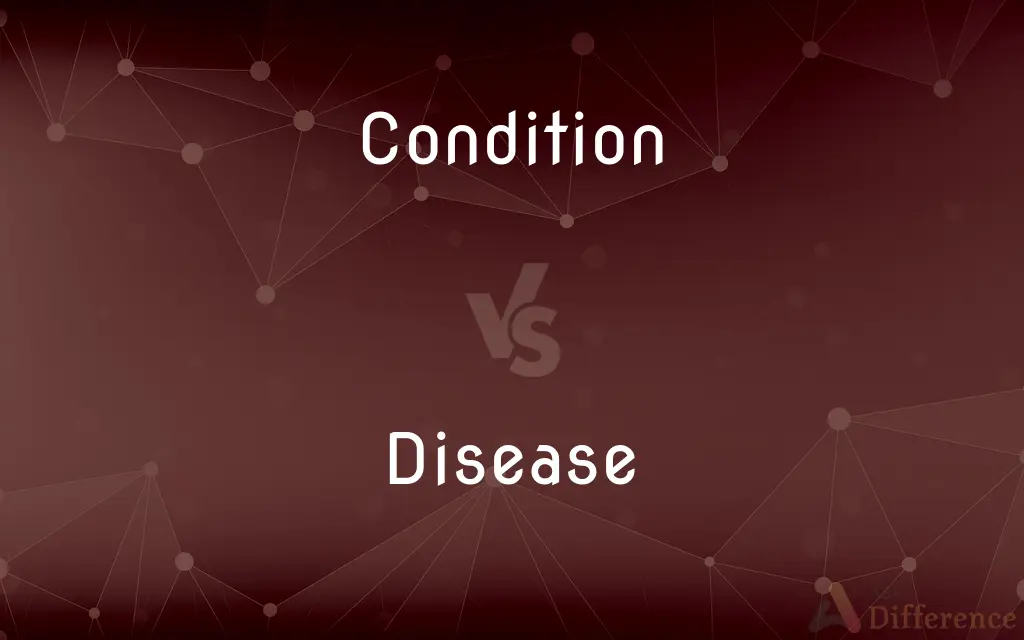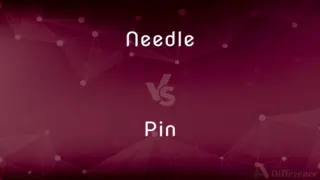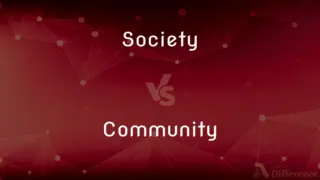Condition vs. Disease — What's the Difference?
Edited by Tayyaba Rehman — By Fiza Rafique — Updated on October 5, 2023
Condition is a state of being, which can be temporary or permanent. Disease is a pathological state typically with identifiable causes and symptoms.

Difference Between Condition and Disease
Table of Contents
ADVERTISEMENT
Key Differences
A condition, broadly speaking, is any state of health, whether optimal or suboptimal, and may or may not exhibit pronounced symptoms or have an identifiable cause. A disease, however, typically presents with specific symptoms and often has known causes, often being a pathological state of a part or the whole organism.
Conditions can be temporary, such as a condition of fatigue or pregnancy, which do not necessarily denote an unhealthy state but indicate a particular state of the body. Diseases, contrasting significantly, typically reflect a specific malfunction or abnormal state, such as diabetes or chickenpox, which interferes with normal functioning.
Interestingly, a condition might sometimes be used to describe a disease in certain contexts to soften the impact of a diagnosis, but clinically, it may not have the stringent criteria of a disease. Diseases are often diagnosed following specific biomedical criteria and are often targeted by research and clinical practices because of their identified pathologies.
Additionally, conditions may be physiological, such as the condition of alertness, encompassing a range of normal functioning, while diseases are essentially pathological and are often undesirable due to their impact on health and wellness. Diseases can often lead to complications and can alter the overall condition of a patient, affecting various physiological parameters.
In a clinical context, a condition might also be a broader term, often used to describe a patient’s overall physical state and can be influenced by lifestyle, genetics, and various other factors. Diseases, while they do alter a patient’s condition, are typically more specific, with characteristics like onset, progression, and potential for transmission being key distinguishable features.
ADVERTISEMENT
Comparison Chart
Definition
A state of being with varied health states.
A pathological state with symptoms and causes.
Duration & Permanence
Can be temporary or permanent.
Often has a sustained or chronic nature.
Symptoms & Causes
May or may not have clear symptoms or causes.
Typically has identifiable symptoms and causes.
Perception & Usage
Can be a neutral or softer term.
Often seen as a more serious or clinical term.
Example
Pregnancy is a condition.
Diabetes is a disease.
Compare with Definitions
Condition
The state of something with regard to its appearance, quality, or working order
The wiring is in good condition
The bridge is in an extremely dangerous condition
Disease
A pathological condition with specific symptoms and causes.
Tuberculosis is a disease caused by a specific bacterium.
Condition
A state of physical fitness
Have you exercised enough to get back into condition?.
Disease
A disease is a particular abnormal condition that negatively affects the structure or function of all or part of an organism, and that is not due to any immediate external injury. Diseases are often known to be medical conditions that are associated with specific signs and symptoms.
Condition
A term potentially used to diplomatically describe health states.
Discussing a critical condition requires empathy and understanding.
Disease
To infect with a disease.
Condition
The circumstances or factors affecting the way in which people live or work, especially with regard to their well-being
Harsh working conditions
Disease
A deviation from the normal functioning of the body.
Heart disease affects millions of people worldwide.
Condition
A situation that must exist before something else is possible or permitted
All personnel should comply with this policy as a condition of employment
For a member to borrow money, three conditions have to be met
Disease
Might be communicable, spreading between individuals.
The flu is a contagious disease that spreads easily.
Condition
Have a significant influence on or determine (the manner or outcome of something)
National choices are conditioned by the international political economy
Disease
A disorder of structure or function in a human, animal, or plant, especially one that produces specific symptoms or that affects a specific location and is not simply a direct result of physical injury
Heart disease
Bacterial meningitis is quite a rare disease
Condition
Bring (something) into the desired state for use
A product for conditioning leather
Disease
An abnormal condition of a part, organ, or system of an organism resulting from various causes, such as infection, inflammation, environmental factors, or genetic defect, and characterized by an identifiable group of signs, symptoms, or both.
Condition
Apply a conditioner to (the hair)
I condition my hair regularly
Disease
A condition or tendency, as of society, regarded as abnormal and harmful.
Condition
Set prior requirements on (something) before it can occur or be done
Congressmen have sought to limit and condition military and economic aid
Disease
(Obsolete) Lack of ease; trouble.
Condition
A mode or state of being
We bought a used boat in excellent condition.
Disease
(medicine) An abnormal condition of a human, animal or plant that causes discomfort or dysfunction; distinct from injury insofar as the latter is usually instantaneously acquired.
The tomato plants had some kind of disease that left their leaves splotchy and fruit withered.
Condition
Conditions Existing circumstances
Economic conditions have improved. The news reported the latest weather conditions.
Disease
(by extension) Any abnormal or harmful condition, as of society, people's attitudes, way of living etc.
Condition
(Archaic) Social position; rank.
Disease
Lack of ease; uneasiness; trouble; vexation; disquiet.
Condition
A state of health
Has the patient's condition deteriorated?.
Disease
(obsolete) To cause unease; to annoy, irritate.
Condition
A disease or physical ailment
A heart condition.
Disease
Lack of ease; uneasiness; trouble; vexation; disquiet.
So all that night they passed in great disease.
To shield thee from diseases of the world.
Condition
One that is indispensable to the appearance or occurrence of another; a prerequisite
Compatibility is a condition of a successful marriage.
Disease
An alteration in the state of the body or of some of its organs, interrupting or disturbing the performance of the vital functions, and causing or threatening pain and weakness; malady; affection; illness; sickness; disorder; - applied figuratively to the mind, to the moral character and habits, to institutions, the state, etc.
Diseases desperate grown,By desperate appliances are relieved.
The instability, injustice, and confusion introduced into the public counsels have, in truth, been the mortal diseases under which popular governments have every where perished.
Condition
One that restricts or modifies another; a qualification
I'll make you a promise but with one condition.
Disease
To deprive of ease; to disquiet; to trouble; to distress.
His double burden did him sore disease.
Condition
(Grammar) The dependent clause of a conditional sentence; protasis.
Disease
To derange the vital functions of; to afflict with disease or sickness; to disorder; - used almost exclusively in the participle diseased.
He was diseased in body and mind.
Condition
(Logic) A proposition on which another proposition depends; the antecedent of a conditional proposition.
Disease
An impairment of health or a condition of abnormal functioning
Condition
A provision making the effect of a legal instrument contingent on the occurrence of an uncertain future event.
Disease
Can be chronic or acute, affecting health over varying durations.
Alzheimer’s disease progressively impairs cognitive functions.
Condition
The event itself.
Disease
Often studied in biomedicine for cures and management strategies.
Research into autoimmune diseases is crucial for developing treatments.
Condition
To make dependent on a condition or conditions
Use of the cabin is conditioned on your keeping it clean.
Condition
To stipulate as a condition
“He only conditioned that the marriage should not take place before his return” (Jane Austen).
Condition
To cause to be in a certain condition; shape or influence
“Our modern conceptions of historiography [are] conditioned by Western intellectual traditions” (Carol Meyers).
Condition
To accustom (oneself or another) to something; adapt
Had to condition herself to long hours of hard work.
Conditioned the troops to marches at high altitudes.
Condition
To render fit for work or use
Spent weeks conditioning the old car.
Condition
To improve the physical fitness of (the body, for example), as through repeated sessions of strenuous physical activity.
Condition
(Psychology) To cause (an organism) to respond in a specific manner to a previously unrelated stimulus, as in operant conditioning or classical conditioning.
Condition
To treat (the air in a room, for example) by air-conditioning.
Condition
To replace moisture or oils in (hair, for example) by use of a therapeutic product.
Condition
A logical clause or phrase that a conditional statement uses. The phrase can either be true or false.
Condition
A requirement or requisite.
Environmental protection is a condition for sustainability.
What other planets might have the right conditions for life?
The union had a dispute over sick time and other conditions of employment.
Condition
(law) A clause in a contract or agreement indicating that a certain contingency may modify the principal obligation in some way.
Condition
The health status of a medical patient.
My aunt couldn’t walk up the stairs in her condition.
Condition
A certain abnormal state of health; a malady or sickness.
Condition
The state or quality.
National reports on the condition of public education are dismal.
The condition of man can be classified as civilized or uncivilized.
Condition
A particular state of being.
Hypnosis is a peculiar condition of the nervous system.
Steps were taken to ameliorate the condition of slavery.
Security is defined as the condition of not being threatened.
Aging is a condition over which we are powerless.
Condition
(obsolete) The situation of a person or persons, particularly their social and/or economic class, rank.
A man of his condition has no place to make requests.
Condition
To subject to the process of acclimation.
I became conditioned to the absence of seasons in San Diego.
Condition
To subject to different conditions, especially as an exercise.
They were conditioning their shins in their karate class.
Condition
To make dependent on a condition to be fulfilled; to make conditional on.
Condition
(transitive) To place conditions or limitations upon.
Condition
To shape the behaviour of someone to do something.
The children were conditioned to speak up if they had any disagreements.
Condition
(transitive) To treat (the hair) with hair conditioner.
Condition
(transitive) To contract; to stipulate; to agree.
Condition
(transitive) To test or assay, as silk (to ascertain the proportion of moisture it contains).
Condition
To put under conditions; to require to pass a new examination or to make up a specified study, as a condition of remaining in one's class or in college.
To condition a student who has failed in some branch of study
Condition
To impose upon an object those relations or conditions without which knowledge and thought are alleged to be impossible.
Condition
Mode or state of being; state or situation with regard to external circumstances or influences, or to physical or mental integrity, health, strength, etc.; predicament; rank; position, estate.
I am in my conditionA prince, Miranda; I do think, a king.
And O, what man's condition can be worseThan his whom plenty starves and blessings curse?
The new conditions of life.
Condition
Essential quality; property; attribute.
It seemed to us a condition and property of divine powers and beings to be hidden and unseen to others.
Condition
Temperament; disposition; character.
The condition of a saint and the complexion of a devil.
Condition
That which must exist as the occasion or concomitant of something else; that which is requisite in order that something else should take effect; an essential qualification; stipulation; terms specified.
I had as lief take her dowry with this condition, to be whipped at the high cross every morning.
Many are apt to believe remission of sins, but they believe it without the condition of repentance.
Condition
A clause in a contract, or agreement, which has for its object to suspend, to defeat, or in some way to modify, the principal obligation; or, in case of a will, to suspend, revoke, or modify a devise or bequest. It is also the case of a future uncertain event, which may or may not happen, and on the occurrence or non-occurrence of which, the accomplishment, recission, or modification of an obligation or testamentary disposition is made to depend.
Condition
To make terms; to stipulate.
Pay me back my credit,And I'll condition with ye.
Condition
To impose upon an object those relations or conditions without which knowledge and thought are alleged to be impossible.
To think of a thing is to condition.
Condition
To invest with, or limit by, conditions; to burden or qualify by a condition; to impose or be imposed as the condition of.
Seas, that daily gain upon the shore,Have ebb and flow conditioning their march.
Condition
To contract; to stipulate; to agree.
It was conditioned between Saturn and Titan, that Saturn should put to death all his male children.
Condition
To put under conditions; to require to pass a new examination or to make up a specified study, as a condition of remaining in one's class or in college; as, to condition a student who has failed in some branch of study.
Condition
To test or assay, as silk (to ascertain the proportion of moisture it contains).
Condition
Train; acclimate.
Condition
A state at a particular time;
A condition (or state) of disrepair
The current status of the arms negotiations
Condition
A mode of being or form of existence of a person or thing;
The human condition
Condition
An assumption on which rests the validity or effect of something else
Condition
(usually plural) a statement of what is required as part of an agreement;
The contract set out the conditions of the lease
The terms of the treaty were generous
Condition
The state of (good) health (especially in the phrases `in condition' or `in shape' or `out of condition' or `out of shape')
Condition
Information that should be kept in mind when making a decision;
Another consideration is the time it would take
Condition
The procedure that is varied in order to estimate a variable's effect by comparison with a control condition
Condition
Establish a conditioned response
Condition
Train by instruction and practice; especially to teach self-control;
Parents must discipline their children
Is this dog trained?
Condition
Specify as a condition or requirement in a contract or agreement; make an express demand or provision in an agreement;
The will stipulates that she can live in the house for the rest of her life
The contract stipulates the dates of the payments
Condition
Put into a better state;
He conditions old cars
Condition
Apply conditioner to in order to make smooth and shiny;
I condition my hair after washing it
Condition
A general state of health or existence.
Her condition improved after taking medication.
Condition
A physical state that may or may not imply illness.
Pregnancy is a condition that lasts for nine months.
Condition
A medical state without a specified cause.
His condition was stable but required monitoring.
Condition
May refer to temporary states affecting wellness.
Fatigue is a common condition after strenuous exercise.
Common Curiosities
What is a condition in medical terms?
A condition refers to the overall health state of an individual, which can be temporary or persistent.
Can diseases be prevented or managed?
Some diseases can be prevented through vaccinations, and many can be managed through medication and lifestyle changes.
Can diseases be cured?
Some diseases can be cured, while others, particularly chronic diseases, can generally only be managed.
Are all conditions medical concerns?
No, some conditions, like aging, are natural and not intrinsically problematic.
Are diseases always harmful?
Generally, yes – diseases typically disrupt normal functioning and can lead to health complications.
How is a disease typically characterized?
A disease usually has identifiable causes, distinct symptoms, and affects normal physiological functioning.
Can a condition be healthy or normal?
Yes, conditions like pregnancy or adolescence are considered normal health states.
Can a disease affect one’s overall condition?
Yes, diseases often impact the overall health and condition of an individual.
Is every condition diagnosable?
Not necessarily; some conditions might not have clear diagnostic criteria unlike diseases.
Can one condition be a symptom of a disease?
Yes, certain conditions, like hypertension, can sometimes be symptomatic of underlying diseases.
Are conditions and diseases always chronic?
No, conditions and diseases can be acute (short-term) or chronic (long-term).
Can one disease lead to other diseases?
Yes, certain diseases, like diabetes, can increase the risk of developing other diseases.
Are conditions hereditary?
Some conditions might be hereditary, while others might be influenced by external factors.
Can conditions become diseases?
In some cases, if a condition worsens or becomes pathological, it might be classified as a disease.
Can lifestyle influence the occurrence of diseases?
Absolutely, lifestyle choices like diet and exercise can significantly influence the risk of many diseases.
Share Your Discovery

Previous Comparison
Needle vs. Pin
Next Comparison
Society vs. CommunityAuthor Spotlight
Written by
Fiza RafiqueFiza Rafique is a skilled content writer at AskDifference.com, where she meticulously refines and enhances written pieces. Drawing from her vast editorial expertise, Fiza ensures clarity, accuracy, and precision in every article. Passionate about language, she continually seeks to elevate the quality of content for readers worldwide.
Edited by
Tayyaba RehmanTayyaba Rehman is a distinguished writer, currently serving as a primary contributor to askdifference.com. As a researcher in semantics and etymology, Tayyaba's passion for the complexity of languages and their distinctions has found a perfect home on the platform. Tayyaba delves into the intricacies of language, distinguishing between commonly confused words and phrases, thereby providing clarity for readers worldwide.














































